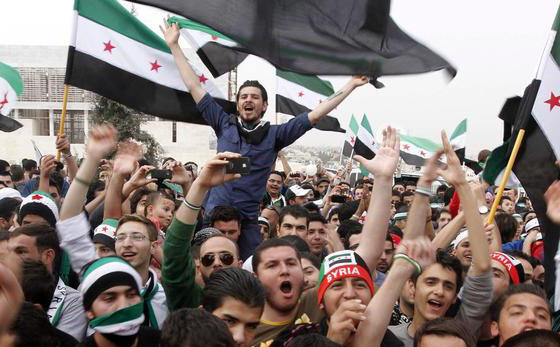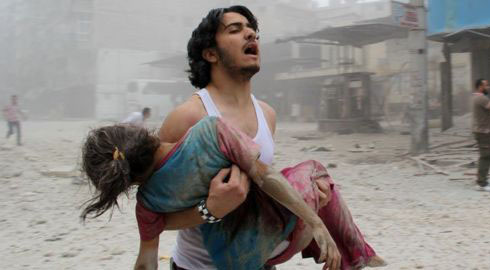BREAKING BARRIERS
Understanding The Syrian Refugee Crisis
Why Exactly is The Situation in Syria, And What is it Like For The Refugees?
The Syrian refugees are coming from a land that has been ravaged from all sides by an ongoing civil war. Several different factions are all fighting for control over the country, but many of the people are being caught in the cross fire. Aside from worrying about if they will be killed, many have had their homes utterly destroyed as well. This situation has caused many Syrians to flee the country.
How It Started
In 2011, what became known as the "Arab Spring" revolts toppled Tunisian President Zine El Abidine Ben Ali and Egyptian President Hosni Mubarak.
That March, peaceful protests erupted in Syria as well, after 15 boys were detained and tortured for having written graffiti in support of the Arab Spring. One of the boys, 13-year-old Hamza al-Khateeb , was killed after having been brutally tortured.

The Syrian government, led by President Bashar al-Assad, responded to the protests by killing hundreds of demonstrators and imprisoning many more. In July 2011, defectors from the military announced the formation of the Free Syrian Army, a rebel group aiming to overthrow the government, and Syria began to slide into civil war (AlJazeera).
Many Things Lead up to The Civil War
Initially, lack of freedoms and economic woes fuelled resentment of the Syrian government, and public anger was inflamed by the harsh crackdown on protesters. Successful uprisings in Tunisia and Egypt energised and gave hope to Syrian pro-democracy activists. Many Islamist movements were also strongly opposed to the Assads' rule.
In 1982, Bashar al-Assad's father, Hafez, ordered a military crackdown on the Muslim Brotherhood in Hama, which killed between 10,000-40,000 people and flattened much of the city. This contributed to causing the Civil War as well (AlJazeera).

Many Different Factions are Fighting For Syria
On November 26, the Syrian army launched a military offensive on Aleppo. In less than a month, Syrian troops, with unfettered Russian air support, were able to recapture 90 percent of the eastern part of Aleppo.
On December 13, the Syrian army claimed that 98 percent of east Aleppo was in the hands of Syrian government forces.
Besides, Aleppo, the Syrian government currently controls the capital, Damascus, parts of southern Syria and Deir Az Zor, much of the area near the Syrian-Lebanese border, and the northwestern coastal region. Rebel groups, ISIL, and Kurdish forces control the rest of the country (AlJazeera).
The War Also Rages Beyond Syrian Borders
Fighting has occasionally spilled over from Syria into Lebanon, contributing to the country's political polarisation. Several rounds of peace talks have failed to stop the fighting (AlJazeera)
Recovery Will Not be Easy
But with much of the country in ruins, millions of Syrians having fled abroad, and a population deeply traumatised by war, one thing is certain: Rebuilding Syria after the war ends will be a lengthy, extremely difficult process (AlJazeera).

The Conditions
Families are struggling to survive inside Syria, or make a new home in neighboring countries. Others are risking their lives on the way to Europe, hoping to find acceptance and opportunity. And harsh winters and hot summers make life as a refugee even more difficult. At times, the effects of the conflict can seem overwhelming.
But one fact is simple: millions of Syrians need our help. According to the U.N., it will take $7.7 billion to meet the urgent needs of the most vulnerable Syrians. That was in 2016, and the war still rages in 2017 (Mercy Corps).
The Crisis is Affecting Children Too
“As the evacuees slowly recover from the shock of their ordeal, we’re starting to hear harrowing stories from children who have seen their parents die right in front of them,” said Chris Latif, World Vision’s response manager for northern Syria. “The death and destruction they’ve witnessed is beyond belief."
Children affected by the Syrian Civil War are at risk of becoming ill, malnourished, abused, or exploited. Millions have been forced to quit school (World Vision).

Even The Weather Makes Refugee Life Difficult
Half of Syria’s pre-war population — more than 11 million people — have been killed or forced to flee their homes. Harsh winters and hot summers make life as a refugee even more difficult. At times, the effects of the conflict can seem overwhelming (globalresearch.ca)
The Refugee Camps Offer a Very Difficult Life as Well
To live life as a refugee would be testing for even the toughest individuals, yet it is important to remember that there are 2.8 million Syrian refugees living that very life across the Syrian border and in neighbouring countries. They are distressed, surrounded by agony and pain with very little hope and very little in the way of provisions. Life at the refugee camps is very difficult for each and every Syrian refugee because of the trials and tribulations they have to face every single day.